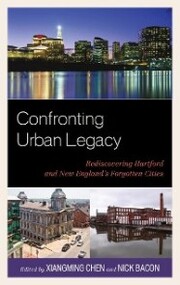Detailansicht
Confronting Urban Legacy
eBook - Rediscovering Hartford and New England's Forgotten Cities
ISBN/EAN: 9780739149447
Umbreit-Nr.: 813126
Sprache:
Englisch
Umfang: 324 S.
Format in cm:
Einband:
Keine Angabe
Erschienen am 18.10.2013
Auflage: 1/2013
E-Book
Format: EPUB
DRM: Adobe DRM
- Zusatztext
- <span><span>Confronting Urban Legacy</span><span> fills a critical lacuna in urban scholarship. As almost all of the literature focuses on global cities and megacities, smaller, secondary cities, which actually hold the majority of the worlds population, are either critically misunderstood or unexamined in their entirety. This neglect not only biases scholars understanding of social and spatial dynamics toward very large global cities but also maintains a void in students learning. This book specifically explores the transformative relationship between globalization and urban transition in Hartford, Connecticut, while including crucial comparative chapters on other forgotten New England cities: Portland, Maine, along with Lawrence and Springfield, Massachusetts. Hartfords transformation carries a striking imprint of globalization that has been largely missed: from its 17</span><span><sup>th</sup></span><span> century roots as New England first inland colonial settlement, to its emergence as one of the worlds most prosperous manufacturing and insurance metropolises, to its present configuration as one of Americas poorest post-industrial cities, which by still retaining a globally lucrative FIRE Sector is nevertheless surrounded by one of the nations most prosperous metropolitan regions.<br><br>The myriad of dilemmas confronting Hartford calls for this book to take an interdisciplinary approach. The editors introduction places Hartford in a global comparative perspective; Part I provides rich historical delineations of the many rises and (not quite) falls of Hartford; Part II offers a broad contemporary treatment of Hartford by dissecting recent immigration and examining the demographic and educational dimensions of the city-suburban divide; and Part III unpacks Hartfords current social, economic, and political situation and discusses what the city could become. Using the lessons from this book on Hartford and other underappreciated secondary cities in New England, urban scholars, leaders, and residents alike can gain a number of essential insights</span><span></span><span>both theoretical and practical.</span></span><br><span></span><br><span></span>
- Kurztext
- <span><span>In a field over-saturated with research on global cities and megacities, this is the first academic book to analyze specifically </span><span>small </span><span>cities and regions in New England. The book contains contributions from sociologists, anthropologists, historians, political scientists, politicians, grassroots leaders, and urban/regional planners. </span></span> <span></span> <span></span>
- Autorenportrait
- <span><span>In a field over-saturated with research on global cities and megacities, this is the first academic book to analyze specifically </span><span>small </span><span>cities and regions in New England. Focusing on the dynamic urban/global legacy of Hartford, Connecticut, the volume is bolstered by comparative chapters on Portland, Maine, Lawrence, Massachusetts and Springfield, Massachusetts. The book contains contributions from sociologists, anthropologists, historians, political scientists, politicians, grassroots leaders, and urban/regional planners. </span></span> <span></span>
